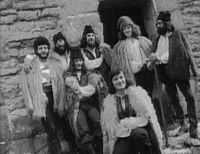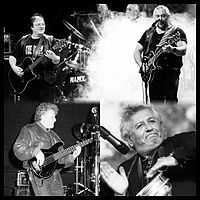Transsylvania Phoenix
| Phoenix | |
|---|---|
|
| |
| Background information | |
| Also known as | Sfinții, Transsylvania Phoenix |
| Origin | Timișoara, Romania |
| Genres | Rock, ethno rock, rock and roll, progressive rock, psychedelic rock |
| Years active | 1962–present |
| Labels | Electrecord, Bacillus Records, Extra Records & Tapes, Eurostar Records, Genius CD, Cat Music, Phoenix Records |
| Website | www.formatiaphoenix.ro |
| Members |
Nicu Covaci Adam Costin Volker Vaessen Dan Albu Dzidek Marcinkiewicz Marc Alexandru Tinț Flavius Hosu |
| Past members | See: List of Transsylvania Phoenix band members |
Transsylvania Phoenix (also known as Phoenix in Romania) is a Romanian rock band formed in 1962 in Timișoara by guitarists Nicu Covaci and Kamocsa Béla. Guitarist Claudiu Rotaru, vocalist Florin "Moni" Bordeianu and drummer Ioan "Pilu" Ştefanovici completed the early lineup. The group became famous in Romania in the 1970s when it started fusing their 1960s rock and roll sound with traditional folk music, thus pioneering the "ethno rock" subgenre.
After gaining popularity in Romania during the so-called British invasion in the mid-60s, Phoenix were banned from performing and recording in 1970 when, on his last concert as a group member before emigrating to the United States, vocalist Florin "Moni" Bordeianu made derogatory remarks about Nicolae Ceauşescu's regime and its approach to western music. The group would reach legend-status amongst Romanians in 1977 when they illegally fled to West Germany, exposing themselves to risks such as being arrested by Ceauşescu's Securitate. They have been estimated to have sold over 2 million albums in Romania.[1]
History
Phoenix was launched in the cosmopolitan city of Timișoara in 1962 by a pair of schoolboys: Nicu Covaci and Béla Kamocsa, under the name of Sfinţii (The Saints). In their first years, together with Florin "Moni" Bordeianu (born 1948), they performed in school contests and at local clubs, covering Western music hits from The Rolling Stones, The Beatles, The Who, etc., and they quickly became very popular amongst the youth. In 1965 the Communist authorities demanded that the band stop performing under the name The Saints, because of the religious innuendo that the name carried. Forced to comply, the band took the name Phoenix. Nicu Covaci also changed the composition of the band, around 1963, by adding Claudiu Rotaru, Ioan "Pilu" Ştefanovici (born 1946) and Günther "Spitzly" Reininger (born 1950) to the lineup.
In 1965 they had their first big concert in Bucharest. Their performance brought a collaboration with Cornel Chiriac to record some of their songs. The first songs they recorded were "Ştiu că mă iubesti şi tu" ("I Know You Love Me Too"), "Dunăre, Dunăre" ("Danube, Danube") and "Bun e vinul ghiurghiuliu" ("Good is the Red Wine"). The same year also marked the beginning of their collaboration with Victor Suvagau , who went on to write many of their most famous songs, such as "Vremuri" ("Old Times"), "Şi totuşi ca voi sunt" ("And Yet I Am Like You"), "Nebunul cu ochii închişi" ("The Fool with Eyes Closed"), "Floarea stîncilor" ("Mountain Flower") and "Canarul" ("Canary").
In December 1967 Phoenix had their first major series of concerts in many western cities, capped off by two huge concerts in Timișoara. After winning a few prizes in national students' contests, held at Iaşi the following year, in 1968 they recorded their first EP, Vremuri, containing two original songs, Vremuri and Canarul, and two covers (Lady Madonna - The Beatles and Friday on My Mind - The Easybeats). A second EP would follow one year later, named Floarea stîncilor (The Flower of the Rocks), with all four songs being original compositions. Both albums sport a sound reminiscent of the beat style popular in those days.
They then started working on a rock theater play "Omul 36/80" (The Man 36/80) which won several prizes for originality.
In 1969 Ioan "Pilu" Ştefanovici was replaced by Dorel "Baba" Vintilă Zaharia (born 1943). For the next year the band became more and more popular, frequently visiting Bucharest and being invited onto talk shows about music.
In 1970, Moni Bordeianu emigrated to the United States, and, for a brief period of time the band suspended its activity, also due to total censorship that followed a protesting speech held by Bordeianu in his last concert. 1970 meant the blues period of the band. The formula used was Nicu Covaci - guitar, Günther "Spitzly" Reininger - piano and voice, Zoltán Kovács - bass guitar and Liviu Butoi - oboe and flute. Phoenix was born again the next year, with Covaci, Josef Kappl, Mircea Baniciu, Costin Petrescu (replaced in 1974 by Ovidiu Lipan, nicknamed "Ţăndărică") and Valeriu Sepi.
But the Communist officials were not very comfortable with the Western-style music that they were singing, and kept creating them problems. So Phoenix abandoned beat turned to Romanian folklore, pagan rituals, mystic animals and old traditions. In this same year, Phoenix started a collaboration with the Institute of Ethnography and Folklore and the Folklore section of Timișoara University on an ambitious project, a rock poem that combined traditional wooden instruments with modern sounds. During this project the band also started collaborating with Valeriu Sepi (born 1947), who eventually joined the band. The first outcome would be the 1972 LP Cei ce ne-au dat nume (Those Who Gave Us a Name) - the second LP to be recorded in Romania by a Romanian band. Two years later, Mugur de fluier (Flute Bud) followed. Both albums underwent severe censorship.

In 1973 Phoenix represented Romania at the "Golden Harp" festival in Bratislava (Slovakia), and then at the "Disc festival" in Sopot (Poland). Also, they wanted to record a new rock-opera, named "Meşterul Manole", but the communist officials censored it all, by "losing" the unique book with costume sketches and lyrics given to them for official approval. The result was only an EP with an extract from the opera, Meşterul Manole, uvertură (Meşterul Manole, uverture) and two older songs, Mamă, Mamă (Mother, Mother) and Te întreb pe tine, soare... (I'm asking you, sun...).
On Monday, 19 November 1973, Phoenix held a memorable concert in Bucharest, presenting their new hits "Andrii Popa", "Pavel Cneazul", "Mica Ţiganiadă" and "Strunga" which composed the new disc "Mugur de fluier". The new songs were still influenced by folklore yet had a new style. This style was the result of the collaboration with new songwriters Andrei Ujică and Şerban Foarţă. Based on those new songs Nicu Covaci created a new show "Introducere la un concert despre muzica veche la români" ("Introduction to a concert about old Romanian music") in which he introduced violins, flutes, archaic percussion and other traditional instruments. The show was never finished due to a new collaboration with "Cenaclul Flacăra". This period is considered the peak for Phoenix. Their sound was considered original and powerful and full stadiums were common for their concerts.
Every winter the members of the band would retreat to Mount Semenic and plan their upcoming songs. That winter the show "Zoosophia", a title that would later change to "Cantafabule", was created. The show began by "calling" all mythic animals and continued by dedicating a song to each of them, finishing with the Phoenix, the band's symbol. The year 1975 brought a newcomer to the band, Ovidiu Lipan "Ţăndărică" (born 1953). The "Cantafabule" show was first presented in Timișoara in February 1975. The disc was recorded in a very short time and was published the same year with a misspelling in the title: "Cantofabule." What followed were two years of almost continuous concerts but also the creation of the soundtrack for the movie "Nemuritorii".
By this time, the popularity of Phoenix had grown huge; people loved their songs not only for what they were, but also because they contained thinly-veiled allusions to the Communist regime. The band members, especially Nicu Covaci, found themselves increasingly harassed by the Securitate. Covaci married a Dutch woman and left the country in 1976. He returned in 1977, bringing in relief aid for those struck by the powerful earthquake on March 4. After two grandiose concerts in Constanţa and Tulcea, Covaci surprisingly left the country again, this time with all the band members (except Baniciu) hidden inside their Marshall speakers - a huge undertaking, since in Communist Romania it was extremely difficult to obtain approval to travel abroad, and illegal border crossing was punished with imprisonment.
The 1980s
After arriving in Germany, Phoenix disbanded. Kappl and a few others (Erlend Krauser, Ovidiu Lipan) formed a new band, Madhouse and released a not very successful album named From The East. In 1981, Covaci co-opted Neumann and Lipan and English bassist Tom Buggie, under the name Transsylvania Phoenix (since a band named Phoenix already existed) and released an LP named Transsylvania, containing two old Phoenix songs translated into English to target the Western audience and five new ones. Covaci together with Kappl also released two EPs and one maxi single as Transsylvania-Phoenix.
Comeback
In 1990 Phoenix made a modest comeback to Romania. Despite the fact that they were expected to sing their first song in their hometown Timișoara, the city that sparked the Romanian Revolution of 1989 that eventually led to the downfall of the Communist regime, their first post-1989 concert took place in Bucharest, the capital of Romania. Phoenix also stopped composing new music and just kept selling compilations of their old record for over a decade. Internal conflicts, especially between Covaci and Baniciu, were making headlines in the media.
A new album appeared in 2000, the first original album after their 1990 comeback attempt; with the exception of Covaci, the lineup comprised none of the members from the '70s.
In 2002, the 40th anniversary of the band brought together some of the former members.
At the end of 2005 the band released a new album, named Baba Novak, in its classic gold lineup.
As of 2010, the band still performs at live events.
Band Members
For more details on this topic, see List of Transsylvania Phoenix band members
- Nicu Covaci - rhythm and lead guitar, lead and backing vocals (1962–present)
- Costin Adam - lead vocals (2014–present)
- Dan Albu - rhythm guitar, backing vocals (2014–present)
- Dzidek Marcinkiewicz - keyboards, backing vocals (1983, 1985-1999, 2008–present)
- Marc Alexandru Tinț - lead guitar (2014-present)
- Volker Vaessen - bass guitar (1992–1993, 1999–2000, 2002–2005, 2008-)
- Flavius Hosu - drums (2014–present)
- Current touring musicians
- Sergiu Corbu Boldor - violin (2014–present)
- Andrei Cerbu - guitar (2014-present)
Discography
- Vremuri (Old Times), 1968, EP
- Floarea stîncilor (The Flower of the Rocks), 1969, EP
- Cei ce ne-au dat nume (Those Who Gave Us a Name), 1972, LP (re-edited on CD in 1999)
- Meşterul Manole, 1973, EP
- Mugur de fluier (Flute Bud), 1974, LP (re-edited on CD in 1999)
- Cantofabule (Cantafables), 1975, 2LP
- Transsylvania, 1981, LP
- Ballade For You/The Lark, 1987, single
- Tuareg/Mr. G's Promises, 1988, single
- Tuareg, 1988, maxi-single
- Ciocîrlia/Perestroika (The Lark/Perestroika), 1990, single
- Remember Phoenix, 1991, LP
- SymPhoenix/Timișoara, 1992, CD/MC/2LP
- Evergreens, 1993, CD/MC
- Cantafabule - Bestiar, 1996, CD
- Anniversare 35 (35th Anniversary), 1997, CD/MC
- Vremuri, anii '60... (Old Times, The 60s), 1998, CD/MC
- În umbra marelui urs (2000)
- Baba Novak, 2005
- Back to the Future, 2008
- Vino, Țepeș!, 2014
